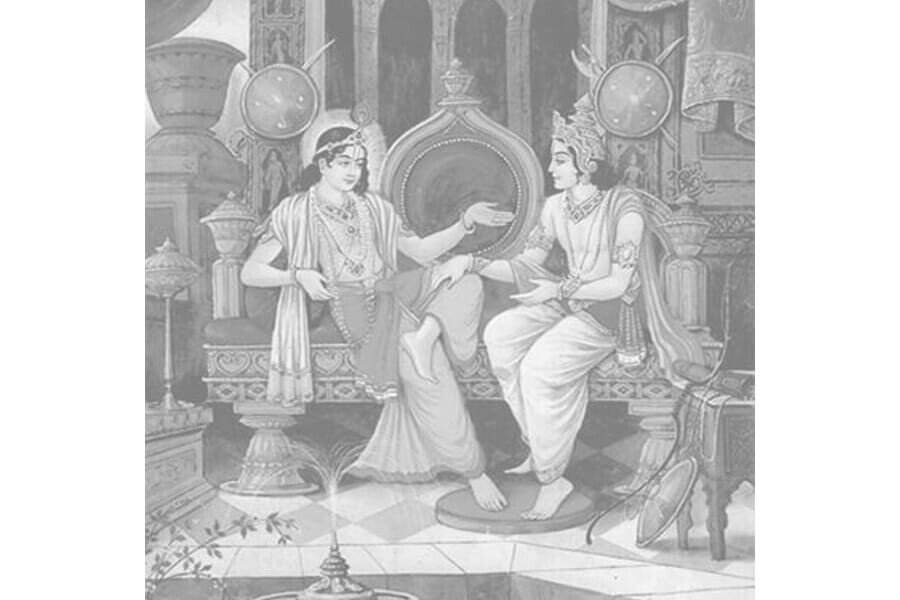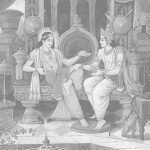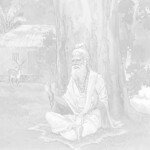Why Sri Krishna did not save the Pandavas when they played dice with Duryadhana & Shakuni
Since childhood, Uddhava had been close to Krishna, charioting him and serving him in several ways. He never asked for any wish or boon from Sri Krishna. When Krishna was at the verge of completing his life’s mission on earth, he called Uddhava and said, “Dear Uddhava, in this avatar of mine, many people have asked and received boons from me; but you have never asked me for anything. Why don’t you ask for something now?”
Even though Uddhava had never asked anything for himself, he had been carefully observing Krishna since his childhood. He had always wondered about certain contradictions between Krishna’s teachings and actions, and had always wanted to understand the reasons for these apparent or real contradictions.
So he asked Krishna, “I have observed that several things you have done or not done in your life were different from what you have always taught or stood for. I truly wish to understand why — for instance, during the great yuddha, the role you played confounds me to this day. I’m curious and wish to understand. Will you explain?”
Krishna said, “Uddhava, please ask without hesitation.”
Uddhava then said, “Krishna, you were a dear friend of the Pandavas. They trusted you fully as their protector and friend. You not only know what is happening, but you also know what is going to happen. You are a sarvajnani and a trikaldarshi. Then why did you not stop Yudhisthira from playing the game?”
Before Krishna could answer, Uddhava continued, “Ok, even if you did not stop him, why did you not turn the luck in favor of Yudhisthira — that would have ensured the victory of dharma?
“But that too you did not do. You could have at least saved Yudhisthira by stopping the game after he lost his wealth, country and himself. You could have released him from the punishment for gambling. Or, you could have entered the hall when he started betting his brothers. You did not do that either.
“At least, when Duryodhan tempted Yudhisthira by offering to return everything he had lost by putting Draupadi on stake, you could have intervened, and with your divine power you could have made the dices roll in a way favorable to Yudhisthira. But your intervention came only when Draupadi almost lost her modesty.
“Everyone knows that you saved Draupadi’s modesty by your intervention, but what modesty is left of a woman once she is dragged into the hall by a man and almost disrobed in front of so many people? What did you really save? Only when you help a person at the time of crisis can you be called a protector. But you did not help in the real time of crisis — was that dharmic?”
Smiling, Krishna replied, “Dear Uddhava, this is simple: he who uses viveka, the discriminating intelligence, wins! Duryodhan used his viveka, Yudhisthira did not. So Yudhisthira lost. That is how it happens."
Uddhava seemed quite lost and confused.
Krishna continued, “While Duryodhana had the wealth to gamble, he did not know how to play the game of dice, and so he used his Uncle Shakuni to play the game while he did the betting. That is the use of viveka. Yudhisthira too could have thought similarly and offered that I, his cousin, would play on his behalf. Now, if Shakuni and I had played the game of dice, who do you think would have won?
“I can forgive the fact that he forgot to include me in the game, but, without viveka, he committed another blunder. He prayed that I should not come to the hall because he did not want me to know that he was playing the game. So he tied me down with his prayers and prevented me coming into the hall. I was just outside all the while, waiting for someone to call me through their prayers. Even when Bheema, Arjuna, Nakula and Sahadeva were lost, they were only cursing Duryodhana and brooding over their fate; they forgot to call me.
“Even Draupadi did not call me when Dusshasan held her hair and dragged her in on his brother’s orders. She got into argument in the court, quite sure of her own abilities. She never felt the need to call me. Finally, when Dusshasan started actually disrobing her, she gave up depending on her own strength and shouted for me. Only then did I get the chance to intervene, and I reached as soon as I was called. I saved her. What did I do wrong?’”
Uddhava exclaimed, “Wonderful explanation, Kanha, I am impressed but not deceived. Can I ask you another question?’”
Krishna said, “Sure, go ahead, Uddhava.”
“Does this mean that you come only when you are called? Will you not come on your own to help people in crisis, to prevent injustice, adharma?”
Krishna smiled as he said, “Uddhava, all beings and events are moved by the subtle laws of Karma. I don’t run the laws of karma, I don’t interfere, I am only a witness. I stand close to you and observe whatever is happening. This is the Divine’s dharma!”
Uddhava exclaimed again, “Wow! Very good, Krishna. In that case, you will stand close to us, observe all our stupidities and do nothing? And we will keep blundering and you will keep observing? Would you then want us to keep making mistakes of all kinds and suffer?”
Krishna replied, “Uddhava, do realize the deeper meaning of your statements. Once you know that I am standing as witness right next to you, will you continue making mistakes, acting stupidly, living unconsciously? You all overlook this and believe that you can do things without my knowledge. That is when things go wrong. Yudhisthira’s error was that he thought he could play the game of dice without my knowledge. If Yudhisthira had realized that I am always present within everyone as the inner witness, would the game not have finished differently?”
Uddhava reflected within himself — What a sublime truth! Krishna, the Supreme Lord, the mover of the worlds, is always with us and within us, the constant inner sakshi … we only have to live in this knowledge and surrender to Him, invoke Him in all our thoughts and actions.. not just sakshi but anumanta and Ishwara. This indeed was Krishna’s simple truth to Arjuna throughout the Gita — nimitta matra bhava : become an instrument only, and my intervention will be constant.











